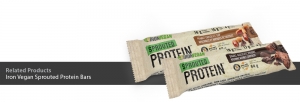

Sprouted Plant Protein Bars do the Heavy Lifting
Whether you consider yourself an athlete or simply like to stay active and fit, dietary protein is essential for building lean muscle and promoting healthy metabolism. However, did you know that you might not be getting enough to meet your body composition goals?
Canadians have long been told to aim for .08 grams of daily dietary protein per kilogram of body weight, but athletes who train for endurance or strength, for example, may require from 1.2-2 grams of protein per kilogram body weight daily.[1]
Increasing protein consumption may not seem easy. Animal sources of protein get the majority of press because they contain all nine of the essential amino acids required for muscle protein synthesis. For a variety of reasons, however, you may want to reduce or eliminate animal foods from your diet, including personal preference or sensitivity reactions like bloating. Yet, rumours persist that plant protein is inferior for muscle protein synthesis. So how can you be sure you’re getting enough?
Contrary to what the standard western diet might suggest, plant-based foods are the leading source of protein world-wide and comprise 57% of daily global protein intake. Plant-based diets are not only associated with health benefits including reduced risk of diabetes and cardiovascular disease and certain types of cancer,[2] but also can be surprisingly high in protein. Grain-like seeds such as amaranth and quinoa provide a well-balanced composition of amino acids as well as albumin and globulin proteins.[3]
Other plant foods may be deficient in an amino acids such as lysine, but when combined with additional foods over the course of a day provide all the required protein building blocks. Nutrient-dense nuts, seeds and legumes including peanut, almond, cashew, flax, pumpkin and sesame seeds, for example, are good sources of the amino acid leucine that is critical for muscle protein synthesis.
While raw plant foods are good, benefits increase when grains and seeds are sprouted. The germination process triggers plant enzymes to begin to break down starches, which makes it easier for you to digest and absorb nutrients. Sprouting also increases antioxidant activity while at the same time reduces anti-nutrients like phytic acid that can inhibit absorption of dietary minerals.[4]
Finally, sprouting generates a significant boost in amino acids.[5] Compared to raw, for example, sprouted quinoa shows a 30% increase in antioxidants and high concentrations of γ‐aminobutyric acid (GABA).4 Germinated brown rice contains higher levels of glutamic acid, alanine, and glycine versus the raw grain.[6]
Of course, sprouting your own plant foods takes time – which you might not have when you’re on the way to the gym or running around doing errands! Consider tossing a few Sprouted Protein BarsTM from Iron Vegan into your bag to enjoy throughout the day. Each delicious bar quickly provides 16 grams of protein from organic sprouted gluten-free amaranth, brown rice concentrate, millet, pumpkin seeds and quinoa plus a variety of nutrient-dense ingredients such as almond, cashew and sesame seeds. Reaching your protein goals has never been easier!


[2] Joy, J. M., Lowery, R. P., Wilson, J. M., Purpura, M., De Souza, E. O., Wilson, S. M. C., … Jäger, R. (2013). The effects of 8 weeks of whey or rice protein supplementation on body composition and exercise performance. Nutrition Journal, 12, 1–7.[2] Lonnie, M., Hooker, E., Brunstrom, J. M., Corfe, B. M., Green, M. A., Watson, A. W., … Johnstone, A. M. (2018). Protein for Life: Review of Optimal Protein Intake, Sustainable Dietary Sources and the Effect on Appetite in Ageing Adults. Nutrients, 10(3), 1–N.PAG.
[3] Janssen, F., Pauly, A., Rombouts, I., Jansens, K. J. A., Deleu, L. J., & Delcour, J. A. (2017). Proteins of Amaranth ( Amaranthus spp.), Buckwheat ( Fagopyrum spp.), and Quinoa ( Chenopodium spp.): A Food Science and Technology Perspective. Comprehensive Reviews in Food Science & Food Safety, 16(1), 39–58.
[4] Paucar, M. L. M., Martínez, V. C., Dueñas, M., Frias, J., & Peñas, E. (2018). Response surface optimisation of germination conditions to improve the accumulation of bioactive compounds and the antioxidant activity in quinoa. International Journal of Food Science & Technology, 53(2), 516–524.
[5] Veluppillai, S., Nithyanantharajah, K., Vasantharuba, S., Balakumar, S., & Arasaratnam, V. (2009). Biochemical changes associated with germinating rice grains and germination improvement. Rice Sci. 16:240–242.